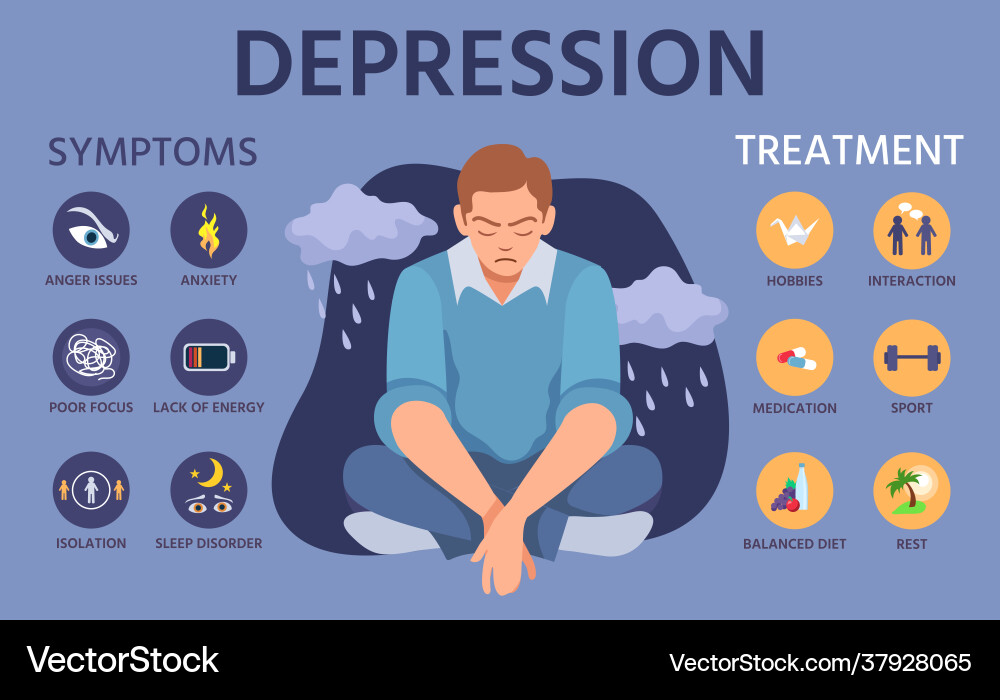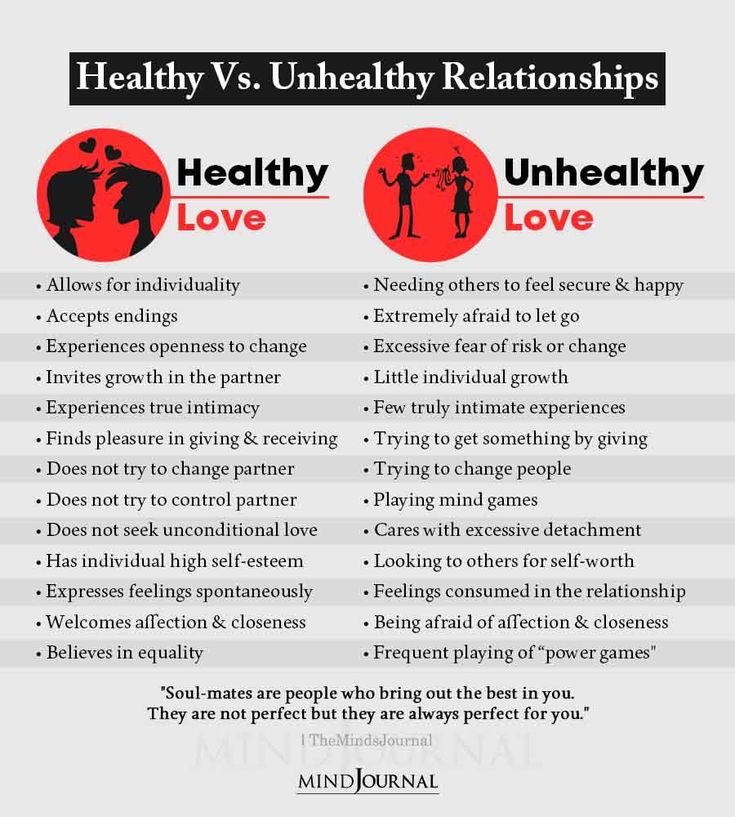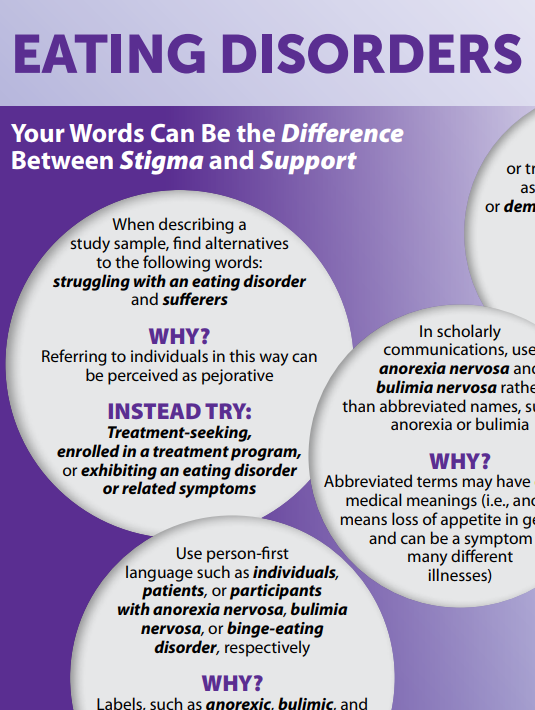Are introverts and extroverts real
Most of us think we're either an introvert or extrovert, but is it backed up by science?
As COVID-19 restrictions finally begin to lift, introverts may feel anxiety and extroverts relief.
But, according to psychiatrist Carl Jung, who introduced the terms into psychology, there's actually no such thing as a pure introvert or extrovert.
"Such a person would be in the lunatic asylum," he famously said.
Most people are ambiverts, he said: extrovert-introvert hybrids.
But the two terms have stuck: from dating profiles to business coaching, extraverts and introverts are loud and proud.
The cliched extrovert is a social and confident person who gets energy from others, while an introvert is the opposite: more of a homebody who recharges alone.
So is there really such a thing as introverts and extroverts, or is it reductive pseudoscience on the complex and fluid subject of personality?
The pure introvert
Sunshine Coast resident Sandy Forster disagrees with Jung. The 62-year-old isn't in a mental asylum; she runs a successful financial coaching business. And she believes she's a pure lifelong introvert.
"I never socialise," she says, "I prefer staying home, in my own thoughts. When I walk my dog, I say hi to the dogs and ignore the humans."
Forster is so far along the introvert scale, her daughter recently remarked, "You don't have any friends". "I thought, is that such a bad thing?" she says.
Loading Twitter content
Up until she was 15 years old, when her next-door neighbours greeted her Forster would be silent. "I'd love an invisibility cloak so I could just observe," she says.
She even recently climbed a cliff to avoid speaking to an approaching acquaintance.
Unsurprisingly, Queensland's relatively brief lockdowns haven't been too arduous for Forster, who believes introversion is in her DNA. "I couldn't understand why people hated lockdown so much," she says.
So, can a diehard introvert ever change?
Nicholas Haslam from the University of Melbourne says it's not inconceivable — but also not easy.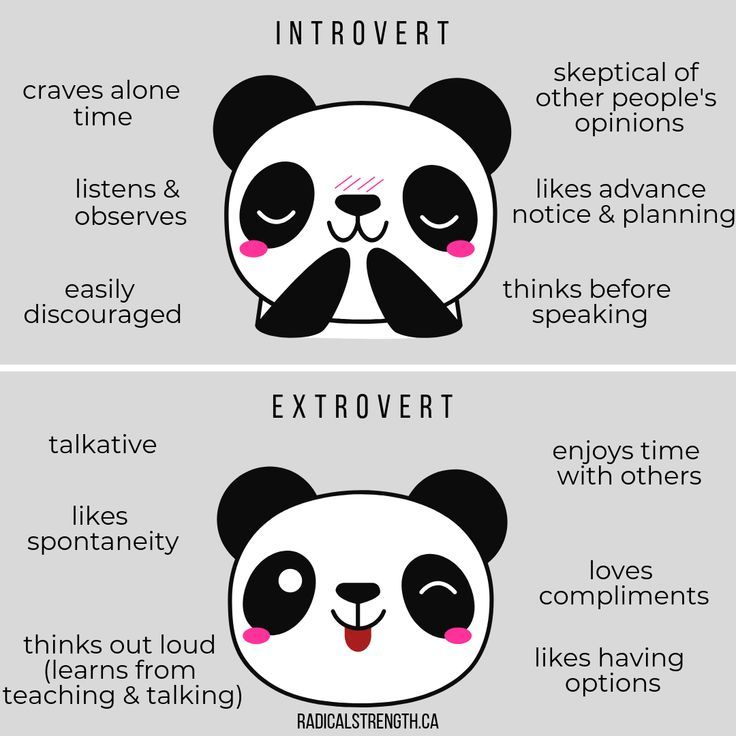 "People don't mature into being more or less extroverted as they become more at peace with themselves," the Professor of psychology says.
"People don't mature into being more or less extroverted as they become more at peace with themselves," the Professor of psychology says.
This chimes with Forster, who says she sometimes adopts an extroverted cloak when running business retreats for clients. "It's like stepping out of my own body, becoming an actor," she says. "It's so exhausting; I get a migraine. The minute workshops are over, I retreat to recharge."
Those who changed
Corrina Lindby from Collinsville in central Queensland had a similarly introverted childhood — so much so, she didn't even attend her senior prom.
"My mother would have to answer questions directed at me," the 57-year-old says.
Corrina Lindby spent her life believing she was an introvert, but then she began to question whether it was just a reaction to being bullied as a child. (Supplied: Corrina Lindby)It seems worlds apart from the forthright woman I speak to today.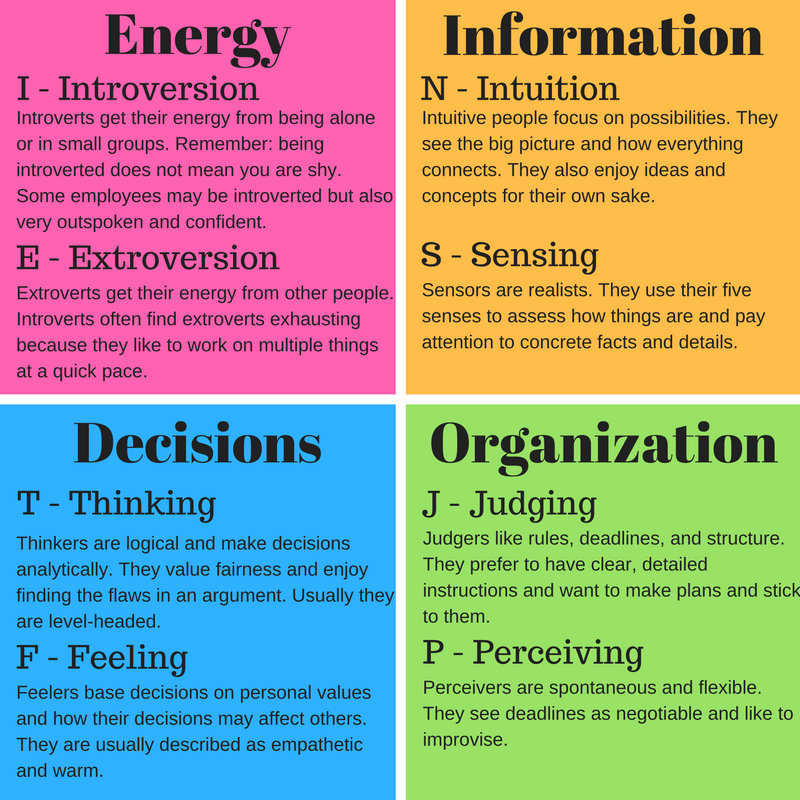 Some of this, though, she attributes to nurture: "After being ridiculed at school, it was a defence mechanism to just say nothing and be in my own head."
Some of this, though, she attributes to nurture: "After being ridiculed at school, it was a defence mechanism to just say nothing and be in my own head."
How did she change from such an extreme introvert into an extrovert?
Corrina says counselling and her faith have helped her become more confident and outgoing. (Supplied: Corrina Lindby)"There came a point I had to decide whether to keep believing I actually was an introvert," she says. "I thought, is this the legacy I want to leave my children? I wanted to be strong and confident and model that for them."
Counselling, and her Christian faith, also helped the transition. "The bible verse, 'I can do all things with Christ's strength with me' helped," she says.
Such "self-talk", she says, can create self-fulfilling prophecies.
As Lindby became the family breadwinner, she believes her husband changed from an extrovert into an introvert as he took on the child-raising role.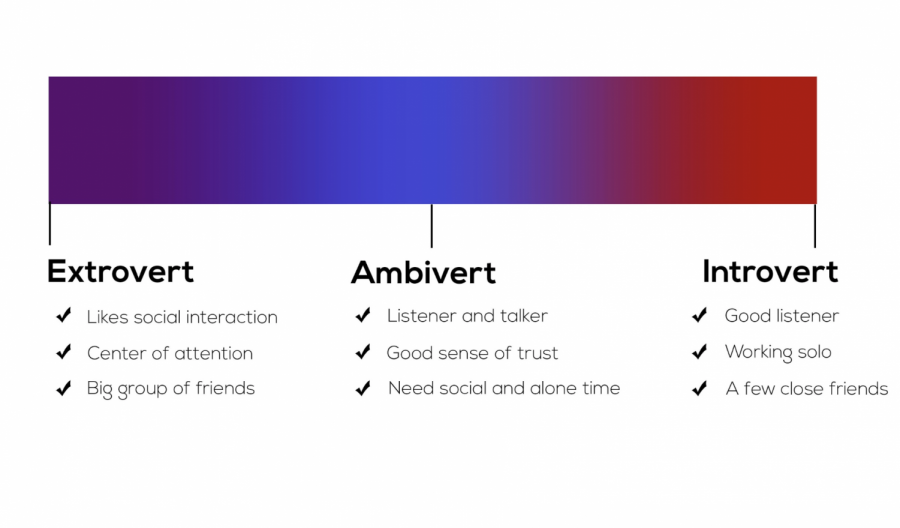
"We'd go to church and the other churchgoers would quote 'unless man provides for himself, he's less of a man'," she says. "It harmed his confidence. If you tell yourself something enough, you believe it."
Extroverts are happier
Extroverts tend to experience more positive emotions than introverts, according to Professor Haslam.
"Research has sought to find why this isn't self-reinforcing — to harvest happiness, why don't we all just act in a more extroverted way?" he says.
"Introverts can find that somewhat exhausting/inauthentic. It's like going against gravity ... No one really wants to become more introverted."
Extrovert to introvert
But yoga teacher Nikki Tiedeman says she happily did just that. The 36-year-old from the NSW Central Coast previously worked in sales.
"As a team leader, you had to inspire others to be part of the very social workplace culture," she says.
After thriving on it in her 20s, becoming a yoga teacher in her 30s transformed her. "Over time it felt forced. I came to hate small talk and large groups — you never got to connect on a deeper level," she says.
"Over time it felt forced. I came to hate small talk and large groups — you never got to connect on a deeper level," she says.
Yoga has connected her to her introverted side: "I was conditioned to think being extroverted and having loads of friends would lead to fulfilment. I never asked if I was doing this because society said I should."
When she did stop, she realised how uncomfortable big groups made her. "I now prefer to look inward to things that satisfy me," she says.
"To re-energise I need reflective alone time. Surprisingly, lockdown has been OK. As I grow older I become more in tune with what I want."
Myers Briggs and dating
Whether or not you subscribe to the controversial Myers Briggs personality type descriptors, they'll likely have an impact on who will date you and who will employ you.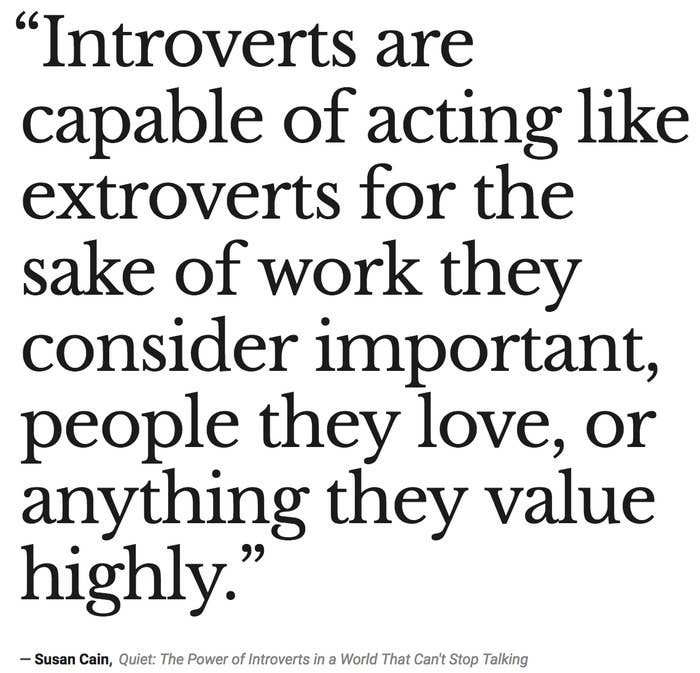
Yet Jessica Alderson swears by it. She fell in love with an Australian and moved to Sydney in 2017 to be with him. When the relationship didn't work out, she set up her own dating site — So Synced — which uses an algorithm to match partners using the Myers Briggs types.
"We pair couples who have just the right amount of difference and similarity to create that spark," she says.
Myers Briggs is used in many workplaces, including most military branches in the US and England and 80 of the Fortune 100 companies, but it's contentious.
Jessica Alderson, who founded a personality-based dating app, swears by the controversial Myers Briggs test. (Supplied: So Synced )Several analyses find the test ineffective. "Myers Briggs has a very low reputation within academic psychology," Professor Haslam says.
"The theory is based on a dog's breakfast. It believes human beings belong to types, when research shows they don't."
Although people often think the types describe them well, this could be the Forer-Barnum effect, similarly used in horoscopes: when individuals believe that ambiguous personality descriptions apply specifically to them.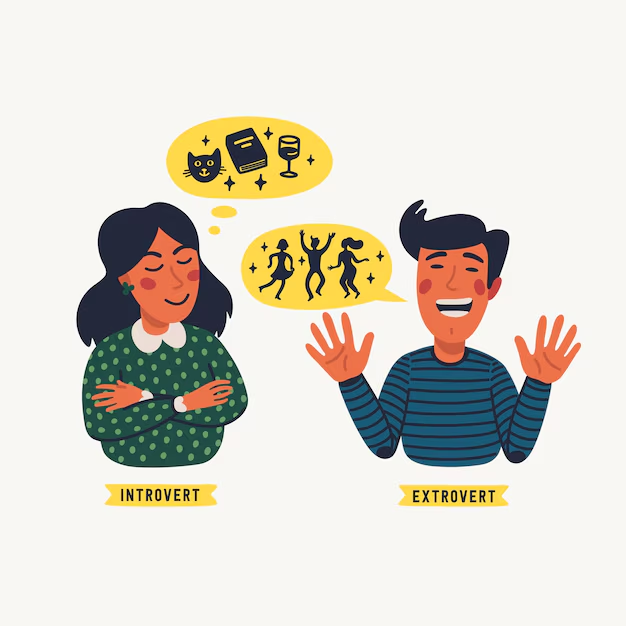
"Any label can limit your horizons," Professor Haslam says. "A poor manager would assign tasks only on people's personality tests."
A new Binge documentary, Persona, reveals the Myers Briggs tests play to racist, sexist and ableist tropes because the questions were designed by the white managerial class.
The science
"Without a doubt, introverts and extroverts exist along a scale," Professor Haslam says. "Every personality psychologist over the last 100 years has recognised that — it fits in with the big five [personality traits] theory: openness to experience, conscientiousness, extraversion, agreeableness, and neuroticism."
Introverts are the experts now
There is one group of social-distancing experts governments have yet to consult: introverts.
Read moreThe problem comes, he says, when people see the personality traits as fixed binaries rather than a continuum, in constant flux: "This idea has taken hold it's where you get your energy from, but [academic psychologists] wouldn't talk about it like that. You don't need to talk about ambiverts if you appreciate the continuum — most of us are in the middle. There's no more an introverted extrovert than there is a short tall person or a tall short person."
You don't need to talk about ambiverts if you appreciate the continuum — most of us are in the middle. There's no more an introverted extrovert than there is a short tall person or a tall short person."
Carl Jung's theory, Professor Haslam says, was unscientific — but more recent studies have shown that personality characteristics are approximately 40 per cent inherited; the rest is experiencing and learnt behaviour.
He blames Susan Cain, the author of two books on introverts, for "romanticising" them. "She gives them all these additional attributes: being bookish and creative. They're really not part of introversion at all," he says.
Melbourne based psychologist Donna Cameron offers a word of warning:
"Often when a person labels themselves as introverted or extroverted, they're at risk of acting out these roles more than they really need to."
Gary Nunn is a freelance journalist.
Posted , updated
The Introvert-Extravert Myth | Psychology Today
A version of this article originally appeared on Inc.
If you don't know whether you're an introvert or extravert, you live under a rock.
The terms were invented by Swiss psychiatrist and psychoanalyst Carl Jung in the 1920s. They've since adopted a prominent, if not undying, life of their own. They're the cornerstone of Myers-Briggs and one of the Big Five traits. Most simply, Jung conceived of introverts as drawing energy from being alone, whereas extraverts draw it from their surroundings and relationships.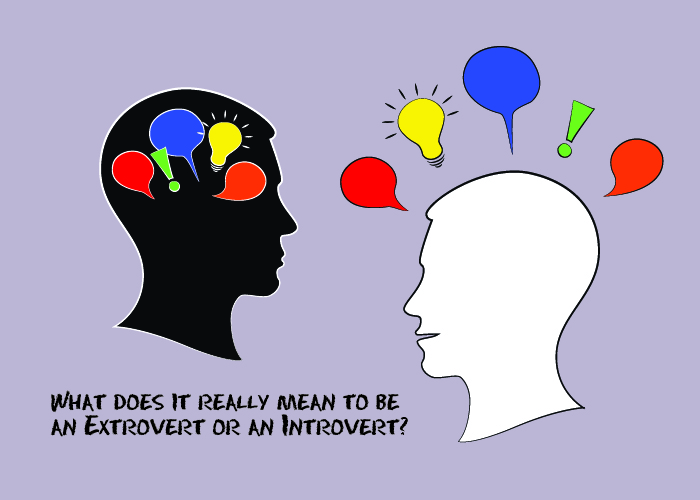
Source: Image by Pathdoc on Getty Images
But the very man who dreamt up what has become the pinnacle of personality labels conceded that "There is, finally, a third group, and here it is hard to say whether the motivation comes chiefly from within or without." In Psychological Types, Jung wrote that this group—not introverts or extraverts—is "the most numerous and includes the less differentiated normal man." In other words, Jung believed that introverts and extraverts are minorities.
What is this mysterious, common third type? Research increasingly points to the existence of "ambiverts": people with balanced, nuanced personalities composed of both introverted and extraverted traits.
According to a Wall Street Journal interview with Wharton psychologist Adam Grant, ambiverts make up between half and two-thirds of the population.
This is good news, because ambiverts win at life and business. The "ambivert advantage" scientifically explains how ambiverts combine the best of both sides. In one of several such studies, ambiverts achieved higher sales productivity than introverts or extraverts—in some cases, twice as much. Because ambiverts can listen as well as assert themselves, they're ideal salespeople, coworkers, business owners, and leaders.
In one of several such studies, ambiverts achieved higher sales productivity than introverts or extraverts—in some cases, twice as much. Because ambiverts can listen as well as assert themselves, they're ideal salespeople, coworkers, business owners, and leaders.
To be sure, diehard introverts and extraverts do exist, but they're exceptions, and they may be worse for it. Furthermore, extreme leanings could be the result of what psychologist Carol Dweck calls a "fixed mindset."
Over several decades, research by Dweck and others has differentiated between growth mindset—believing you can cultivate your qualities and personality with effort—and fixed mindset—conviction that you have a limited amount of intelligence or talent, a certain personality, and immutable character.
A recent study positioned fixed mindset as "self-as-story": You believe you're a certain way; that's just how you are. It's the story you tell yourself about you. The study explained, as an example, that "a person who conceptualizes themselves as introverted may have difficulty recognizing or remembering their own extraverted behavior, or they may avoid potentially stressful social situations and come to live in an increasingly insular world. "
"
After taking some personality tests in college, I decided I was an introvert. I noticed that the more I saw myself as an introvert, the more introverted I became. At 18, I thought I was the life of the party. At 25, I almost convinced myself that I was psychologically incapable of giving speeches.
"Self-as-story" tendencies are associated with reduced wellbeing, particularly if self-conceptualizations are negative. Fixed mindsets are correlated with reduced performance, self-esteem, creativity, resilience and self-awareness.
But still worse is that our story about ourselves isn't true.
The uncovering of ambiverts is part of a larger investigation suggesting that healthy personalities are situational; some experts even think personality is a myth. We're inconsistent. We change more than we think we will depending on what happens. There may not be some permanent, fixed "me"—whether introvert or extravert—to expose.
Research shows that we feel how we act (when we smile, we feel happier) and we act how we believe (if we believe we're introverted, we act that way).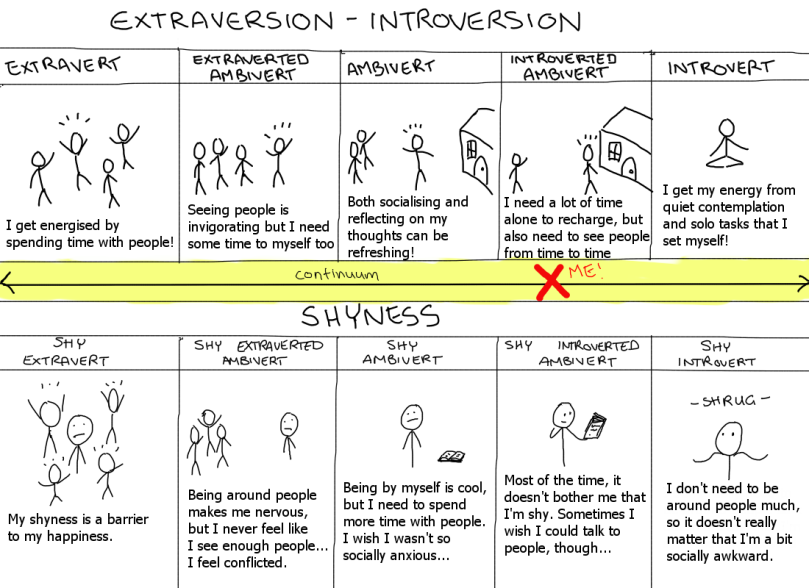 These are adaptive, evolutionary responses. The problem is when our beliefs are grounded in one-off multiple-choice personality quizzes, not everyday reality.
These are adaptive, evolutionary responses. The problem is when our beliefs are grounded in one-off multiple-choice personality quizzes, not everyday reality.
We don't need to understand ourselves so much as we need to understand our situations. We need to ask,
"Does this meeting call for sitting back, listening and taking notes like an introvert, or does it require confidence, assertiveness, and charisma like an extravert?
Or,
"How can I combine the two approaches here effectively?"
Ambiverts recognize that identifying with exclusively one trait is exhausting. You probably do too: Recall a situation where you had too much of what your introverted or extraverted personality stereotypically wants. Jung quipped that anyone 100 percent extraverted or 100 percent introverted would be a "lunatic."
We need both. We are both.
Of course, people's personalities differ. We love to, repeatedly, learn this. But the introvert/extravert debate has a polarizing, restrictive effect on our potential to see and accommodate what a given scenario needs — or even what we need right then. Over time, our success shrinks to a minute sphere of what our personality types can "handle."
Over time, our success shrinks to a minute sphere of what our personality types can "handle."
We resist labels others give us, so why do we give them to ourselves?
Hopefully continued research on ambiversion and situational personality can shed light on what introversion and extraversion really are: self-limiting beliefs.
Sign up for my newsletter to get my articles straight to your inbox.
Extrovert: who is it, signs, difference with introverts
Dividing people into extroverts and introverts began about 100 years ago. We tell you who an extrovert is, what are its disadvantages and advantages, and how such a person can succeed in a career
Who is an extrovert
An extrovert is a sociable, expressive person with an active social position. His experiences and interests are directed to the outside world. Extroverts meet most of their needs through interaction with people. So they replenish energy, receive information and rest. nine0003
Extraversion is one of the main personality parameters. This is evidenced by the five-factor model of personality - the "Big Five". According to this theory, personality consists of five main dimensions: extraversion, agreeableness, conscientiousness, emotionality, openness. Each of them has two poles. For example, extraversion is the opposite of introversion. Some people may lean towards one particular extreme, but most fall somewhere in between. In modern psychology, experts don't divide people into extroverts and introverts. According to research, each of us has traits of both personality types. nine0003
This is evidenced by the five-factor model of personality - the "Big Five". According to this theory, personality consists of five main dimensions: extraversion, agreeableness, conscientiousness, emotionality, openness. Each of them has two poles. For example, extraversion is the opposite of introversion. Some people may lean towards one particular extreme, but most fall somewhere in between. In modern psychology, experts don't divide people into extroverts and introverts. According to research, each of us has traits of both personality types. nine0003
The history of the concept
The division of people into introverts and extroverts, as well as the terms "extroversion" and "introversion" was first proposed by the German scientist Carl Jung in the 1920s. According to Jung, extraversion is a behavioral type, and an extrovert person concentrates his interests on society. Introversion, on the other hand, is characterized by a focus on one's own thoughts and feelings.
As early as 1923, Jung recognized the existence of a third type, ambiversity, but did not include it in his typology of intro-extraversion.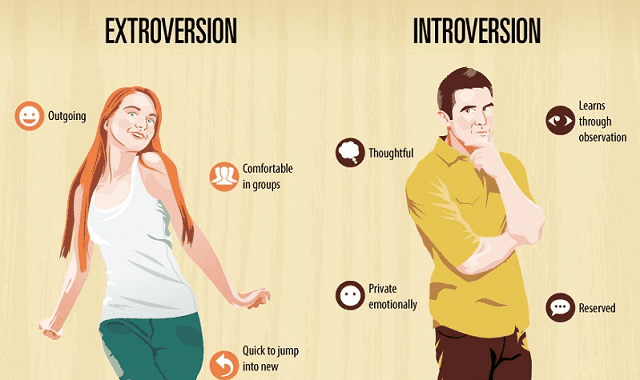 Carl Jung typed people in the direction of their life energy - libido. So, for extroverts, attention and pleasure is directed to objects, and for introverts, personal experience and subjective experiences are of paramount importance. nine0003
Carl Jung typed people in the direction of their life energy - libido. So, for extroverts, attention and pleasure is directed to objects, and for introverts, personal experience and subjective experiences are of paramount importance. nine0003
Jung's research was subsequently developed by the German-British psychologist Hans Eysenck. He developed his own three-factor theory of personality, in which he singled out three main personality dimensions. One of them is "introversion-extroversion". Eysenck argued that a person directs energy inward or outward - on other people, which determines the type of personality.
It is generally accepted that there are more extroverts in the world than introverts, but there are no exact statistics. Psychologists suggest that extroverts are more often "in sight", hence the conclusion that there are more of them. But adapted introverts can easily behave like extroverts. nine0003
Barry Smith, director of the Human Psychophysiology Laboratory at the University of Maryland, says that 68% of the world's population are ambiverts.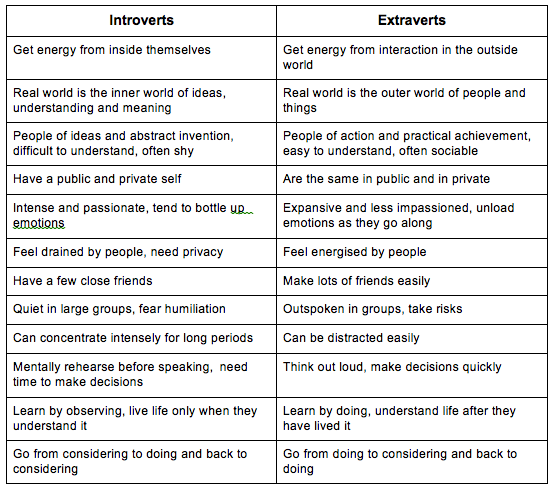 Such people combine the traits of extraversion and introversion.
Such people combine the traits of extraversion and introversion.
Signs of an extravert
American psychologists identify such signs of extraversion as:
- the need to communicate regularly;
- love of public speaking;
- habit of speaking without thinking;
- feeling of discomfort in silence; nine0028
- love for noisy companies;
- pronounced leadership qualities;
- desire to please everyone;
- desire to always be in the spotlight;
- the pleasure of working in a team;
- the ability to talk about one's feelings;
- the presence of a wide circle of communication.
In 2015, American experts described two types of extroverts:
Agentive extroverts are persistent, purposeful, stubborn people. They care about career and personal success. nine0003
- At work . They occupy leadership positions. They take on maximum responsibility, but do not always rationally distribute forces.
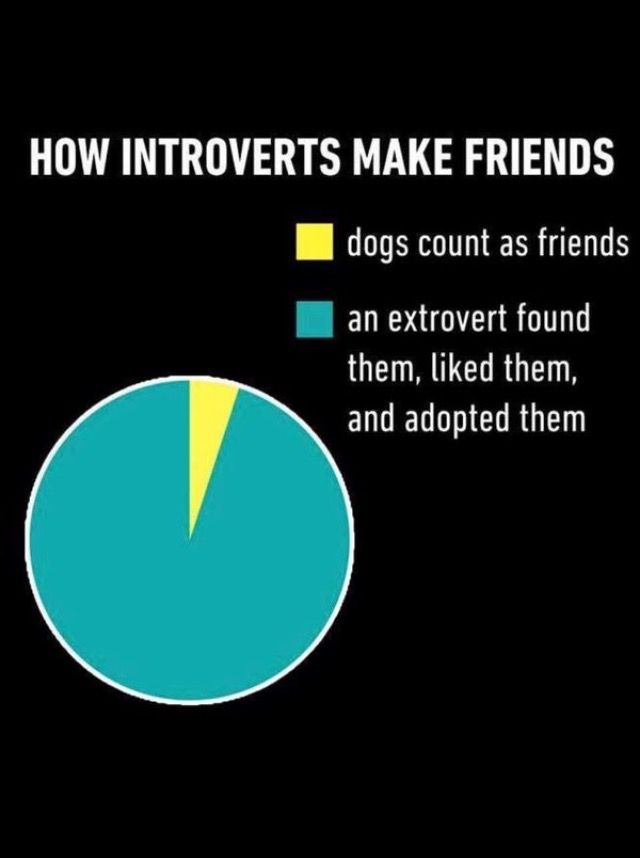 Such people are able to quickly navigate and make decisions, but rarely think through steps ahead. It lacks patience and perseverance.
Such people are able to quickly navigate and make decisions, but rarely think through steps ahead. It lacks patience and perseverance. - Alone . It is difficult for agentive extroverts to sit still, as their nature requires constant dynamics, new emotions and victories. It is important for such people to feel that something is happening around them. nine0028
- In the circle of close people. Openly share emotions and experiences.
- With strangers. Grab attention thanks to self-confidence. Becoming the leader of a group of strangers is a challenge for such people. An extrovert does not get tired of constantly being with someone, on the contrary, for him it is a comfortable environment.
Affiliative extroverts or "social butterflies". For these people, communication is the most important thing. Affiliative extroverts easily establish contact with people, they tend to have many friends and acquaintances. Among the main values for this type of people are warm relationships. nine0003
Among the main values for this type of people are warm relationships. nine0003
- At work. Team players. The best option for them is if the work is related to communication: many meetings and calls, business trips; responsibilities include organizational tasks and supervision of team members. For affiliative extroverts, the microclimate in the team is especially important.
- Alone with yourself. Feel discomfort. In this they are similar to agentive extroverts - they restore energy through communication with people.
- In the circle of close people. nine0054 They try to build trusting relationships. Do not be afraid to talk about feelings and experiences. This is influenced by their main priority - high-quality communication.
- With strangers. Quickly find a common language due to openness and sociability.
Pros and cons of extraversion
Extraversion helps in building a career, but it also has a negative impact on everyday life and communication with people. This was found out by American researchers during a survey in 2012. They compiled a general list of the pros and cons of extraversion. nine0003
This was found out by American researchers during a survey in 2012. They compiled a general list of the pros and cons of extraversion. nine0003
Pros
- Perseverance. The ability to achieve what you want even in difficult circumstances.
- Self-confidence. This quality helps to start a conversation with strangers or people of higher status.
- Flexible thinking. Quickly navigate and adapt to new circumstances - the routine of an extrovert. Without this, a person of this type can get bored.
- Ability to make quick decisions. But this advantage has a downside - the decision will be rash. A typical extrovert does not like to think about something for a long time, weigh the pros and cons and find the most suitable option. He just knows how to make decisions quickly. nine0028
- Openness.
- Ability to communicate.
- Potential for quality public speaking.
- The ability to switch quickly.
- Ability to grasp on the fly.

Cons
- Obsession. Excessive persistence can turn into a significant disadvantage.
- Selfishness turning into narcissism. An extrovert always wants to be the center of attention. He is interested in leading the process and eventually receiving praise. This can grow into hypertrophied vanity. nine0028
- Restlessness.
- Inability to plan.
- Tendency to not see things through to the end. The reverse side of the ability to quickly switch from one task to another.
- Forgetfulness.
- Distracted attention.
- Tendency to quickly change interests and priorities.
The difference between an extrovert and an introvert
An introvert is a person who tends to accumulate energy within himself. He chooses solitude and creation, concentrates on his own interests and intentions. Communication is not a priority for an introvert. nine0003
Colin DeYoung, a psychologist at the University of Minnesota, described the differences in the brains of extroverts and introverts.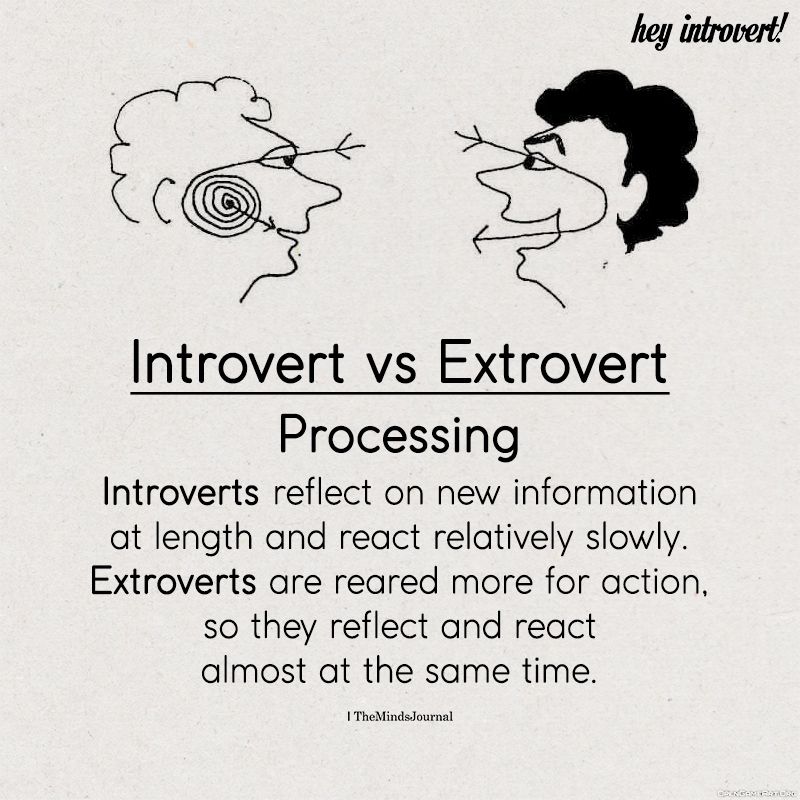 He found that extroverts have a more active dopamine reward system, so they need constant stimulation from the outside. That activity that brings pleasure to the extrovert and helps to satisfy the needs, the introvert irritates, and sometimes depresses. Differences in the work of the reward system lead to the fact that introverts are the least prone to sociability and an active lifestyle. But they have a more “quiet” neurotransmitter, acetylcholine, that works faster. He is responsible for all human movements. Acetylcholine brings the brain out of a state of rest when it is necessary to act, and vice versa, inhibits the transmission of impulses when it is time to concentrate. nine0003
He found that extroverts have a more active dopamine reward system, so they need constant stimulation from the outside. That activity that brings pleasure to the extrovert and helps to satisfy the needs, the introvert irritates, and sometimes depresses. Differences in the work of the reward system lead to the fact that introverts are the least prone to sociability and an active lifestyle. But they have a more “quiet” neurotransmitter, acetylcholine, that works faster. He is responsible for all human movements. Acetylcholine brings the brain out of a state of rest when it is necessary to act, and vice versa, inhibits the transmission of impulses when it is time to concentrate. nine0003
Other American researchers use the term "adventurism gene". Extroverts are distinguished by the desire to get new experiences. For an introvert, on the contrary, interaction with people, activity, quickly turns into overexcitation and fatigue. Therefore, unlike extroverts, they are less prone to sociability and an active lifestyle.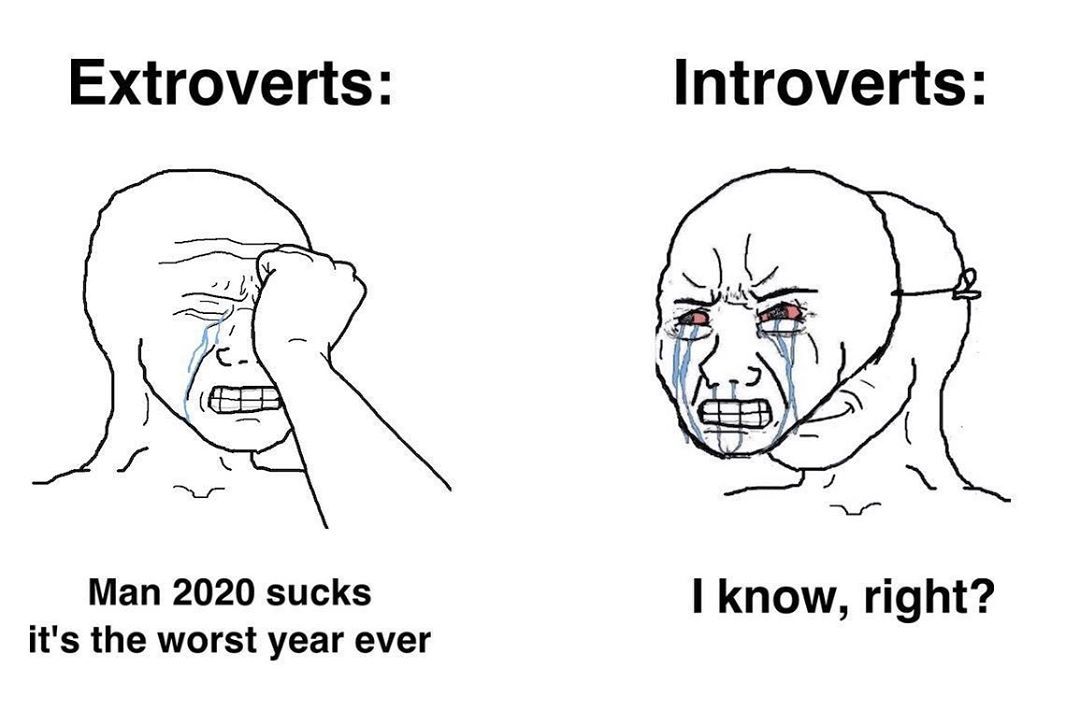
To determine what type of personality you have, take the TED test (or this one in Russian, but you have to answer more than 200 questions). And with the help of the Myers-Briggs indicator, you can more specifically determine your personality type and strengths. nine0003
Can you change your personality type?
Susan Kane in the book Introverts. How to use the features of your character "writes:" Introversion and extraversion are formed in the first months of life or even during pregnancy. By the age of four months, a baby can most likely be assigned to one of two groups. Genetics play a significant role in determining personality, but people can become more or less extroverted.
To develop extraversion , researchers offer to participate in interest clubs or engage in favorite hobbies in a group. So it will be possible to expand the circle of communication and interests, make new acquaintances and improve communication skills with each lesson.
To reduce extraversion, scientists recommend practicing meditation to give yourself the opportunity to focus on your own thoughts and feelings. It pays to spend more time alone. Walk in nature, read, cook and eat alone, reflect. The bridge from extrovert to introvert is journaling. Writing allows you to better understand your own feelings. nine0003
How to raise an extroverted child?
Psychotherapist and communication trainer Ivan Pritulyak notes that extroverted teens are prone to aggressive behavior and disregard for social norms. This is accompanied by complex and strong emotions of the child. The expert recommends talking to children about how they feel and why they may behave aggressively. Every day a child experiences a full range of feelings. For the development of a healthy psyche, this entire spectrum must be recognized and experienced. nine0003
“It is highly likely that introverted parents will have an extroverted child. In this case, parents should try to maintain their peace of mind and not move away from the child, ”says Pritulyak.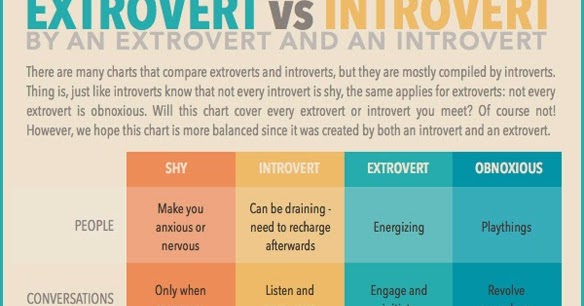
Introverts are good listeners. It is important for extroverts to discuss what is in their hearts, to experience emotions. “An introverted parent is able to build a trusting and close relationship with an extroverted child by listening. The child will say everything himself, ”adds Pritulyak. He should be able to communicate when and with whom he wants - ask a stranger about something on the bus or say hello to neighbors. Such communication can confuse an introverted parent, but it is enough to ensure that communication does not threaten or harm the child. It is also important to provide extroverted children with regular physical activity. Such a child needs to expend energy, and not accumulate it in himself. nine0003
Where it is better for an extrovert to work
It is important for an extrovert to find a place where the hierarchy levels are clearly defined in order to methodically rise to a managerial position. According to Russian psychological studies of pedagogy, our social role depends, among other things, on the type of personality. The need for frequent communication directs the extrovert to work in areas where it is necessary to contact people.
The need for frequent communication directs the extrovert to work in areas where it is necessary to contact people.
Jobs for extroverts:
- HR specialist. nine0054 For the typical extrovert, this is the perfect job. For a recruiting manager, every working day consists of communicating with dozens of job seekers.
- Journalist. The applicant must be, first of all, sociable. Extroverts have good potential for building social connections.
- Teacher. Being the center of attention is the most comfortable state for an extrovert. This is one of the tasks of the teacher - to keep the attention of students. And each lesson is a small public performance. nine0028
- Tour guide. He should become an interlocutor for a dozen tourists. In addition to the fact that you need to establish a dialogue with the group, the guide should be the center of attention throughout the tour, giving information about the sights.
 It's also a kind of public speaking.
It's also a kind of public speaking. - Sales manager. Its main task is to interest a potential buyer. This is not only the art of communication, but also the ability to convince.
- Event leader. nine0054 Such work can leave a psychological trauma if a person is not ready for a long public speaking. In addition, the presenter must constantly stir up the interest of the audience and keep its attention on himself.
Find out if you can find a job and build a career according to your temperament and personality type, read here.
Is an extrovert a bad leader?
The leader must be sociable, self-confident, energetic and active. However, scientists from Harvard, Stanford and the University of Chicago found the opposite. Their research shows that introverts perform best in leadership positions because they:
- think over their words and decisions, which does not allow them to take rash actions;
- are good listeners.
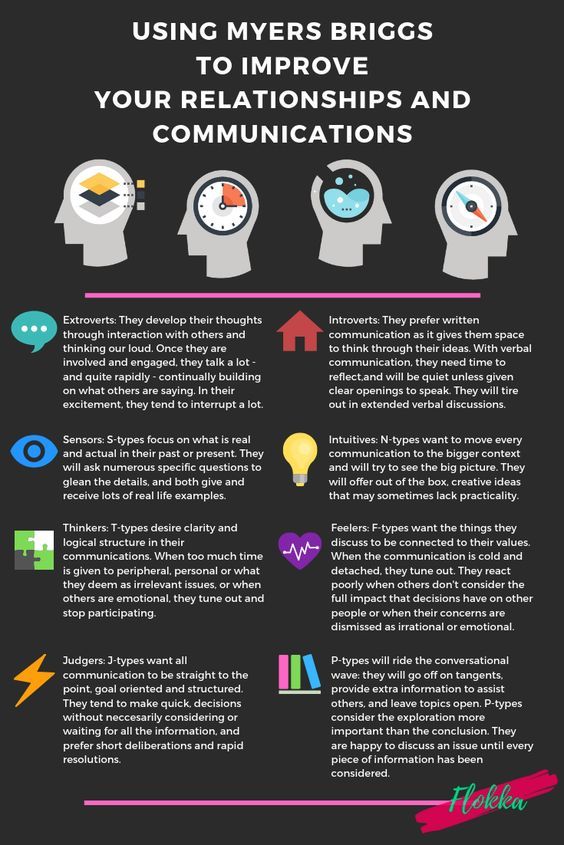 An extrovert often ignores opinion from the outside and makes a personal intuitive decision, because he is not able to concentrate and carefully think about anything. Due to the developed critical thinking and the habit of "digging deep" introverts have a good understanding of people, their actions and motives;
An extrovert often ignores opinion from the outside and makes a personal intuitive decision, because he is not able to concentrate and carefully think about anything. Due to the developed critical thinking and the habit of "digging deep" introverts have a good understanding of people, their actions and motives; - is more effective than extroverts in leading the process in moments of crisis. Introverts do not sow panic, but approach problems rationally. This is good for the team. nine0028
The introvert's management style is called "servant leadership". Such a leader empowers employees, increases their areas of responsibility, boldly delegates and provides opportunities for growth. For an accurate understanding of the leadership style of extroverts and introverts, the researchers suggest comparing Barack Obama and Donald Trump - how they behave and how they act as the President of the United States. So, Obama is known for his thoughtfulness and accurate statements.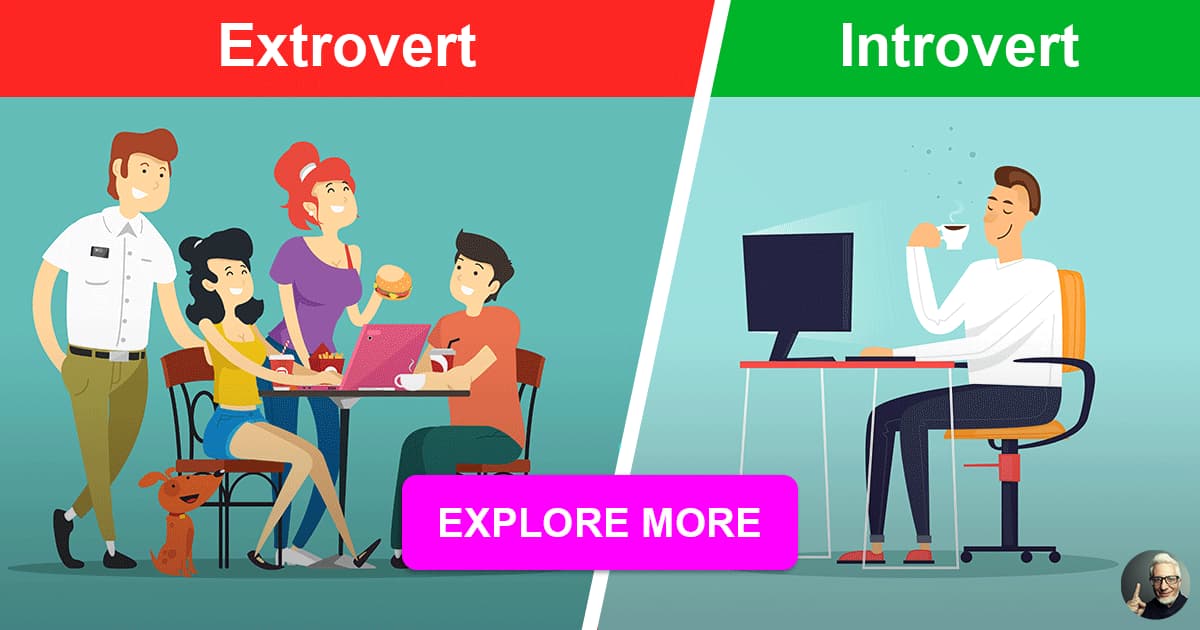 He was often criticized for being arrogant and aloof. Such traits are characteristic of introverts. The American media talked about one of Obama's habits: after meetings and receptions in the evening, he closed himself in his office at the White House and sorted out papers alone. nine0003
He was often criticized for being arrogant and aloof. Such traits are characteristic of introverts. The American media talked about one of Obama's habits: after meetings and receptions in the evening, he closed himself in his office at the White House and sorted out papers alone. nine0003
The opposite political figure is Donald Trump. Expressive and sharp in performances, he plays with intonations and keeps the audience in suspense throughout his speech. American psychologists note that among Trump's prepared provocations was impromptu, a form of public speaking characteristic of an extrovert, which is born due to the strong expressiveness of the individual. Of the typical signs of an extrovert, Trump is characterized by perseverance, stubbornness and impulsiveness.
Extroverts and introverts: kot_kam — LiveJournal
Extroverts and Introverts ?- Society
- Psychology
- Cancel
 And vice versa: someone was born an extrovert, and someone was told from childhood that a normal girl must be sociable, be very bad, and the girl believed, and that means that a person actively communicates and socializes, although in fact she is special - then he doesn’t feel the need for communication ... Of course, one can say that “real introverts / extroverts” are only those who are like that from birth. But, to be honest, you can’t distinguish “real” from “fake” by eye, taste and color - so why multiply entities unnecessarily? nine0002 Tags: In passing, Psychology, Reasoning of an amateur
And vice versa: someone was born an extrovert, and someone was told from childhood that a normal girl must be sociable, be very bad, and the girl believed, and that means that a person actively communicates and socializes, although in fact she is special - then he doesn’t feel the need for communication ... Of course, one can say that “real introverts / extroverts” are only those who are like that from birth. But, to be honest, you can’t distinguish “real” from “fake” by eye, taste and color - so why multiply entities unnecessarily? nine0002 Tags: In passing, Psychology, Reasoning of an amateur Subscribe
-
(no topic)
God, what a charm! "The corporal was gloomy and muttered something about sergeants who win their salaries from honest people with the help of charms ...
-
Lexington Green
Well, American history caught up with me. More precisely, not so much the story itself as the cursed word "village green".
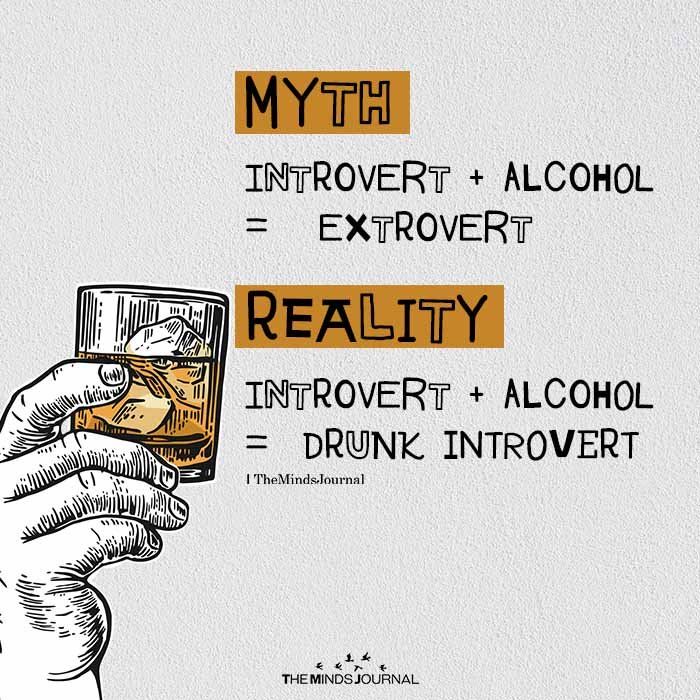 Village green, aka…
Village green, aka… -
Lamatyavnoe
"Frightened breathing rose in the room." (c) Craig Ashton (very nice Englishman obsessed with learning Russian). P.S. This phrase cost me…
Photo
Previous nine0265 ← Ctrl ← Alt
- 1
- 2
Next
Ctrl → Alt →
- 78 comments
Previous
← Ctrl ← Alt
- 1
- 2
Next
Ctrl → Alt →
-
(no topic)
God, what a charm! "The corporal was gloomy and muttered something about sergeants who win their salaries from honest people with the help of charms .

Learn more





